The definition of waste has changed in today’s world. It can generate Revenue in Crores , Waste is no longer considered as trash or abandoned material, but as an asset or resource. Many developed nations have adopted the strategies of the integrated waste management system to maximise waste-based revenues in the form of energy, fuels, heat, recyclables, value-added products, and chemicals, alongside more jobs and business opportunities. Its Time for India.It is estimated that waste management in India is potentially a $15 billion industry.
Out of the entire waste produced in India, 25% are dry waste components that can be recycled. This recyclable waste, dumped into landfills due to a lack of proper collection and infrastructure, can be reused as raw material. If it is properly segregated and processed further, it can be a highly lucrative source of revenue generation.

Every industry is looking for higher profit margins. It is difficult to raise prices due to severe competition , many are focusing on cost reduction. The cost of raw materials used to make items accounts for a large component of the total cost of manufacturing. If minimised, the production cost can be radically reduced. This is where recyclable waste, sometimes known as “scrap” , comes in. As a result, the demand for recyclable waste is expanding.
With more and more businesses aiming to find alternative and cost-cutting elements of production, recycled products are equally gaining the demand. India has the required infrastructure in place, however proper channelization of resources is to be done & more and more industry should understand its benefit in long run . If we can capitalize on these resources, it can generate an unimaginable amount of revenue, employment opportunities, and a lesser carbon footprint.

According to the ministry of environment, forest, and climate change, under the government of India, India is the fifth-largest economy in the world. The nation generates approximately 62 million tons of waste with an average annual growth rate of 4%. It is also found that currently, India generates 70 million metrics of municipal solid wastes. Out of it, only 20% is recycled and the rest ends up in landfills and oceans affecting humans, and marine life, along with destroying the environment. This necessitates a solid waste management system in place.
It is estimated that waste management in India is potentially a $15 billion industry. Out of the entire waste produced in India, 25% are dry waste components that can be recycled. This recyclable waste, dumped into landfills due to a lack of proper collection and infrastructure, can be reused as raw material. If it is properly segregated and processed further, it can be a highly lucrative source of revenue generation.
According to the Un-Plastic Collective (UPC) study, India produces 9.46 million tonnes of plastic waste per year, with 40% of it remaining uncollected. India also generates about two million tonnes (MT) of e-waste annually, which makes plastics and electronics two key components of waste generation. However, these waste generation components, alongside solid waste, have a huge potential to be capitalised into channels of high revenue generation.
We help you finding Customers , Turnkey Manufacturers for Recycling plant & Related Sourcings .
With more and more businesses aiming to find alternative and cost-cutting elements of production, recycled products are equally gaining the demand. India has the required infrastructure in place, however proper channelization of resources is to be done & more and more industry should understand its benefit in long run . If we can capitalize on these resources, it can generate an unimaginable amount of revenue, employment opportunities, and a lesser carbon footprint.
Every industry is looking for higher profit margins. It is difficult to raise prices due to severe competition , many are focusing on cost reduction. The cost of raw materials used to make items accounts for a large component of the total cost of manufacturing. If minimised, the production cost can be radically reduced. This is where recyclable waste, sometimes known as “scrap” , comes in. As a result, the demand for recyclable waste is expanding.
With more and more businesses aiming to find alternative and cost-cutting elements of production, recycled products are equally gaining the demand. India has the required infrastructure in place, however proper channelization of resources is to be done & more and more industry should understand its benefit in long run . If we can capitalize on these resources, it can generate an unimaginable amount of revenue, employment opportunities, and a lesser carbon footprint. It is stated that a tonne of recycled paper saves 17 trees, 2.5 barrels of oil, 4100 kWh of electricity, 4 cubic metres of landfill space, and 31,780 litres of water. Imagine the impact we can create by Proper Recycling of Wastes / Scraps…
